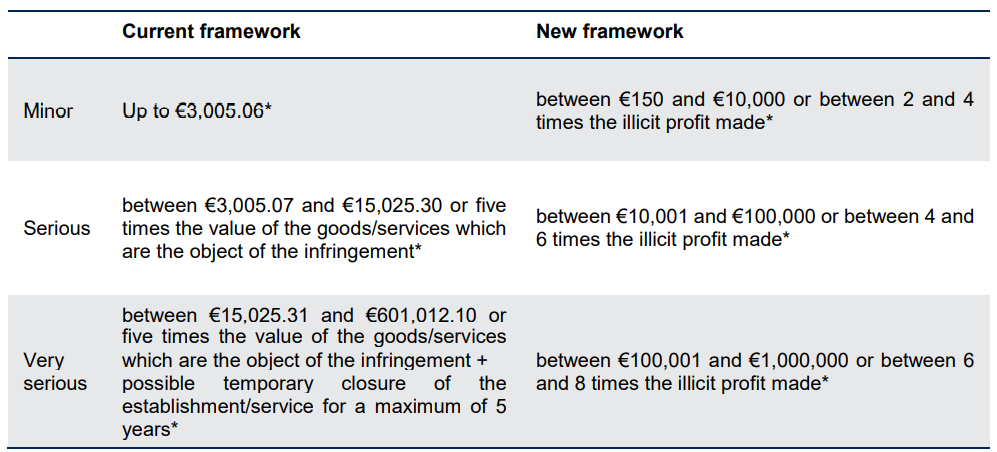In brief
In April, Royal Decree-Law 7 of 27 April 2021 was passed. It introduced major amendments to Royal Legislative Decree 1 of 16 November 2007, approving the revised text of the General Consumer and User Protection Act and other supplementary acts (with initials in Spanish, TRLGDCU), which we analysed in our May newsletter.
These amendments were largely the result of two European Directives aimed at improving consumer and user protection. However, Directive (EU) 2019/2161 of the European Parliament and of the Council of 27 November 2019 on better enforcement and modernisation of consumer protection rules in the EU, which was due to be transposed by 28 November 2019, was still to be transposed.
At last, by means of Royal Decree-Law 24 of 2 November 2021 on the transposition of European Union directives, the new amendment to the TRLGDCU that we have been waiting for has been approved. These changes to the TRLGDCU will come into force on 28 May 2022 – as required by Directive 2019/2161 – except for the amendment relating to article 107(5) of the TRLGDCU, which sets out the trader’s obligation to refrain from using any content created by the consumer when using digital content or services provided by the trader, which will come into force on 1 January 2022.
The most important change is probably the overhaul of the sanctioning framework of the TRLGDCU. However, there are also new provisions on commercial practices and consumer contracts and on commercial practices that are considered unfair.
Changes to the sanctioning framework:
As mentioned above, the most important change is probably the overhaul of the sanctioning framework in the TRLGDCU. The key developments in this regard are as follows:
- Some general principles to be taken into account for the application of the sanctioning framework in the area of consumer affairs and unfair practices are introduced and clarified. It is clarified how penalties should be applied in cases where (i) the same act can be qualified as an infringement on the basis of two or more legal provisions; (ii) there are derivative or concurrent infringements; or (iii) there are continuous infringements over time.
- The changes introduce the express possibility of obtaining a reduction in the classification of the infringement – from serious to minor or from very serious to serious – if the offender remedies the infringement, provided that (i) the sanctioning proceedings have not been initiated; (ii) the breaches are duly rectified; (iii) no direct damage has been caused; and (iv) any sums collected are voluntarily repaid. This reduction may not be applied for continuous infringements or regular practice, and/or where the infringement poses a risk to the health or safety of consumers.
There is also provision for the possibility of settling the case where the offenders propose binding commitments that address the effects of the infringements on consumers and the public interest is safeguarded.
There is also provision for the possibility of settling the case where the offenders propose binding commitments that address the effects of the infringements on consumers and the public interest is safeguarded.
- Sanctions are significantly increased (see below) and it is stipulated that their imposition must ensure, in any case, that committing the infringement is not more profitable than not complying with the rules infringed:

*plus possible additional sanctions
It is also stipulated that very serious infringements or infringements arising from proceedings at EU level (Article 21 of Regulation 2017/2394) will be published and freely accessible.
- The system of responsibilities has also been revised. Here we should note the express determination that joint offenders of the same infringement shall be independently liable, and this group includes advertisers and advertising agencies with regard to infringements involving subliminal or misleading advertising or advertising that infringes the provisions of the regulations on the advertising of certain goods or services.
It is established that importers or first distributors shall be jointly and severally liable for the infringements of their suppliers or providers, notwithstanding their own liability for their own infringements when, as part of their duty of care, they have failed to take measures within their power to prevent the commission of such infringements.
Another change is the introduction in the TRLGDCU of liability for the persons on the governing or management bodies of the legal persons being sanctioned, as well as for the responsible officers.
In order to avoid liability as importers/first distributors or natural persons who are members of legal persons, we believe that proof of having internal procedures in place to demonstrate that due diligence has been exercised may play an important role.
- As you will be aware, the Autonomous Communities are responsible for sanctioning infringements in the area of consumer affairs. However, the new sanctioning framework includes the possibility that the competent consumer affairs body of the General State Administration may open sanctioning proceedings when (i) the infringement causes damage or risks to the interests of consumers or users on a widespread basis in the territory of more than one Autonomous Community and (ii) the integrity of the national market and competition in such market may be affected.
This competence of the State also covers generalised or widespread infringements at EU level and infringements committed via the Internet when the residence or address of the person responsible, provided that it is the same as the place where the administrative management and control of the business is actually carried out, is outside the EU.
- In addition to the aforementioned changes, the system for classifying infringements is also modified. Some categories of infringements have been added or slightly amended, and the General Register of Infringements and Penalties has been created, in which the penalties imposed by any consumer authority will be recorded for the purpose of assessing cases of repeat offences.
Changes with regard to commercial practices and consumer contracts:
The main changes introduced by Royal Decree-Law 24/2021 in the area of commercial practices and consumer contracts can be summarised as follows:
- The competent public authority is given the authority to restrict certain forms and aspects of (i) unsolicited visits by the trader to the consumer’s home or (ii) outings organised by the trader for the purpose or with the effect of promoting or selling goods and services. The cooling-off period in these cases is also extended to 30 calendar days.
- New duties of information are imposed on the trader in relation to commercial practices consisting of (i) offering goods and services on online marketplaces; (ii) offering consumers the possibility to search for goods and services offered on the basis of a keyword query; or (iii) providing access to other consumers’ reviews of the goods and services that the consumer wishes to acquire.
- New duties of information are imposed on the trader before entering into distance or off-premises agreements and, in particular, before entering into distance agreements in online marketplaces.
- Clarification is given to the exceptions to the cooling-off right consisting of (i) the complete performance of the service or (ii) the commencement of the supply of digital content that is not provided on a tangible medium, in both cases, where (a) the performance has begun with the consumer’s prior consent and (b) with the consumer’s knowledge that he or she will lose the cooling-off right. In both cases, it is made clear that these exceptions to the cooling-off right apply when the agreement imposes a payment obligation on the consumer.
Changes in unfair competition law
Royal Decree-Law 24/2021 amends the Spanish Unfair Competition Act 3 of 10 January 1991, introducing new commercial practices by companies in their relations with consumers which, in future, will be considered unfair:
- Marketing a good as identical to a good marketed in another Member State where it has different characteristics will be considered unfair in order to combat the so-called dual quality phenomenon and market discrimination.
- It will be considered a disguised, and therefore unfair, practice to provide search results in response to online queries made by a consumer or user without clearly disclosing that payment has been made to obtain a higher ranking in the search results.
- Any practice intended to evade limits on mass ticket purchases, offering false reviews or failing to take reasonable steps to verify that reviews were actually provided by consumers or users who have used or purchased the good or service shall be deemed to be unfair due to being misleading.
- Where restrictions have been placed on traders in terms of carrying out unsolicited visits to consumers’ or users’ homes or organised outings, failure to comply with such restrictions shall be considered an unfair practice.
Lastly, in order to make it easier for consumers to pursue the actions set out in Article 32 of the Spanish Unfair Competition Act (e.g., the cessation of the unfair conduct, removal and compensation for damages), Royal Decree-Law 24/2021 has introduced a new article in the TRLGDCU under which the commission of an unfair practice against the consumer or user is deemed to have been proven, unless proven otherwise, when a competent authority or court has issued a final decision finding it to have been committed.







